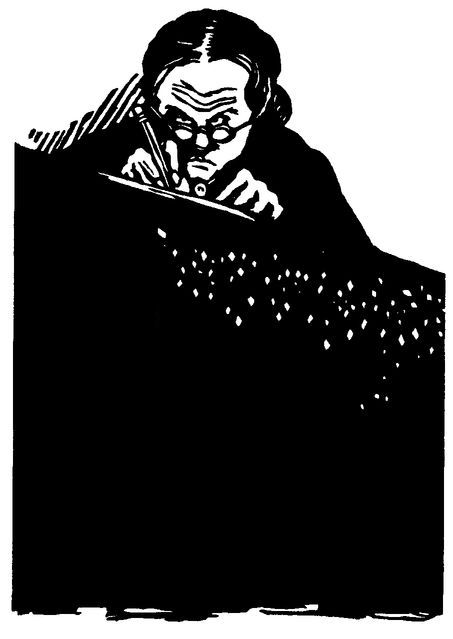
The The Library Policeman
THIS IS FOR THE STAFF AND PATRONS OF THE
PASADENA PUBLIC LIBRARY.
THREE PAST MIDNIGHT
A NOTE ON “THE LIBRARY POLICEMAN”
On the morning when this story started to
happen, I was sitting at the breakfast table with my son Owen. My
wife had already gone upstairs to shower and dress. Those two vital
seven o’clock divisions had been made: the scrambled eggs and the
newspaper. Willard Scott, who visits our house five days out of
every seven, was telling us about a lady in Nebraska who had just
turned a hundred and four, and I think Owen and I had one whole
pair of eyes open between us. A typical weekday morning chez
King, in other words.
Owen tore himself away from the sports section just
long enough to ask me if I’d be going by the mall that day—there
was a book he wanted me to pick up for a school report. I can’t
remember what it was—it might have been Johnny Tremain or April
Morning, Howard Fast’s novel of the American Revolution—but it
was one of those tomes you can never quite lay your hands on in a
bookshop; it’s always just out of print or just about to come back
into print or some damned thing.
I suggested that Owen try the local library, which
is a very good one. I was sure they’d have it. He muttered some
reply. I only caught two words of it, but, given my interests,
those two words were more than enough to pique my interest. They
were “library police.”
I put my half of the newspaper aside, used the MUTE
button on the remote control to strangle Willard in the middle of
his ecstatic report on the Georgia Peach Festival, and asked Owen
to kindly repeat himself.
He was reluctant to do so, but I pressed him.
Finally he told me that he didn’t like to use the library because
he worried about the Library Police. He knew there were no
Library Police, he hastened to add, but it was one of those stories
that burrowed down into your subconscious and just sort of lurked
there. He had heard it from his Aunt Stephanie when he was seven or
eight and much more gullible, and it had been lurking ever
since.
I, of course, was delighted, because I had been
afraid of the Library Police myself as a kid—the faceless enforcers
who would actually come to your house if you didn’t bring
your overdue books back. That would be bad enough... but what if
you couldn’t find the books in question when those strange lawmen
turned up? What then? What would they do to you? What might they
take to make up for the missing volumes? It had been years since
I’d thought of the Library Police (although not since childhood; I
can clearly remember discussing them with Peter Straub and his son,
Ben, six or eight years ago), but now all those old questions, both
dreadful and somehow enticing, recurred.
I found myself musing on the Library Police over
the next three or four days, and as I mused, I began to glimpse the
outlines of the story which follows. This is the way stories
usually happen for me, but the musing period usually lasts a lot
longer than it did in this case. When I began, the story was titled
“The Library Police,” and I had no clear idea of where I was going
with it. I thought it would probably be a funny story, sort of like
the suburban nightmares the late Max Shulman used to bolt together.
After all, the idea was funny, wasn’t it? I mean, the Library
Police! How absurd!
What I realized, however, was something I knew
already: the fears of childhood have a hideous persistence Writing
is an act of self-hypnosis, and in that state a kind of total
emotional recall often takes place and terrors which should have
been long dead start to walk and talk again.
As I worked on this story, that began to happen to
me. I knew, going in, that I had loved the library as a kid—why
not? It was the only place a relatively poor kid like me could get
all the books he wanted—but as I continued to write, I became
reacquainted with a deeper truth: I had also feared it. I feared
becoming lost in the dark stacks, I feared being forgotten in a
dark comer of the reading room and ending up locked in for the
night, I feared the old librarian with the blue hair and the
cat’s-eye glasses and the almost lipless mouth who would pinch the
backs of your hands with her long, pale fingers and hiss
“Shhhh!” if you forgot where you were and started to talk
too loud. And yes, I feared the Library Police.
What happened with a much longer work, a novel
called Christine, began to happen here. About thirty pages
in, the humor began to go out of the situation. And about fifty
pages in, the whole story took a screaming left turn into the dark
places I have travelled so often and which I still know so little
about. Eventually I found the guy I was looking for, and managed to
raise my head enough to look into his merciless silver eyes. I have
tried to bring back a sketch of him for you, Constant Reader, but
it may not be very good.
My hands were trembling quite badly when I made it,
you see.